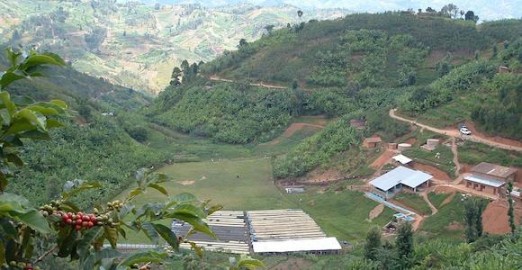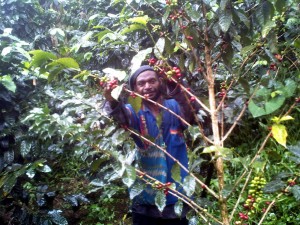Coffee farmers in the Papua New Guinea’s Western Highlands and Jiwaka provinces are planning to capitalise on the growing global demand for sustainable Arabica coffee. With the help of a young entrepreneur who grew up on plantations in the region, they have an ambitious plan to double annual production within two years.

Coffee farming in the Wahgi Valley. Credit: SA-BEAN International
More than one thousand farmers in Western Highlands and Jiwaka provinces currently produce more than 600,000 kilograms of raw green coffee beans a year.
But, according to coffee export and marketing specialist Sabine Joseph of SA-BEAN International, growing global demand for PNG coffee is so big, doubling that amount is feasible, with the right long-term investors.
Family history
Joseph grew up in the Highlands and understands the business.
‘My family has always been involved in managing tea and coffee plantations and I had the opportunity to grow up on these remote plantations, both in India and Papua New Guinea,’ she tells Business Advantage PNG.

SA-BEAN International’s Sabine Joseph
‘We moved from India to Papua New Guinea 30 years ago and my father still continues to manage and rehabilitate coffee plantations in Highlands.
‘I began my own business exporting of goods remote PNG locations—stationery for businesses and schools, Australian wine for hotel chains, and distributors and equipment for various businesses.’
Now based in Melbourne, Australia, her business has expanded to the export and marketing of PNG coffee and development of sustainable farming in remote areas.
Attracting investment
‘My main focus is to now bring in investment into agriculture—in particular coffee—in Papua New Guinea,’ says Joseph. ‘We assist farmers with agricultural advice and other extension services in their communities.’
Coffee farms are managed in the Western Highlands and Jiwaka provinces by Pacific Agricultural Management Services (PAMS). The farmers are shareholders in PAMS and receive a percentage of the profits.
At present, the beans are processed at a wet factory in Kenta, about 20 km south-east of Mount Hagen in Western Highlands Province.
‘Having both a wet and dry processing mill will assist our operations significantly with costs and efficiency. Currently, it is transported eight hours on rough roads to another facility to be dried, which is not ideal.’
‘We currently export Kenta Arabica Coffee as a green bean to Germany, California and a smaller amount to Australia,’ says Joseph.
Seeking investment
But now PAMS wants to expand and is seeking long-term investors to build a new ‘dry mill’, which would entice more farmers to join the company and double production.
‘The reason we need to build a dry mill is to be able to handle coffee bean extraction and the drying processes on site in the Kenta Region,’ says Joseph.
‘Having both a wet and dry processing mill will assist our operations significantly with costs and efficiency. Currently, it is transported eight hours on rough roads to another facility to be dried, which is not ideal.
‘The building of the dry mill will enable us to take more coffee farmers under our management, which will ultimately result in higher production and export levels to cater for current demand.
‘It’s an ideal location, with all existing facilities and utilities like power, telecommunications, water, sewerage and housing for staff.’
Ambitious targets
PAMS has already bought the machinery, and is now preparing to erect the building and install a laboratory facility to check quality and other standards like temperature control, hygiene and sanitation.
But is it possible to double production within two years? Joseph is adamant it is.
‘Development and expansion strategies will be put in place to achieve the goals,’ she tells Business Advantage PNG.
‘This, coupled with infrastructure services, will entice farmers to come on board. A production target of 2.2 million kilos can therefore be achieved in 2016.

A farmer picking the coffee cherry. Credit: SA-BEAN International
‘Once this figure is established, our goal will be to maintain levels at 2.5 million kilos from 2017 onwards and look towards further expansion.’
That expansion includes value adding: roasting and packaging the Kenta brand for export.
Sustainable development
Sustainable development is critical to the success of the venture. It means not just ensuring the farms are functioning but that infrastructure and villagers’ lives improve.
‘We have built a health clinic in Kenta Village in the Highlands and are wanting to improve local infrastructure in the communities such as schools, roads and other services, which allow farmers and their communities a better standard of living,’ says Joseph.








Speak Your Mind